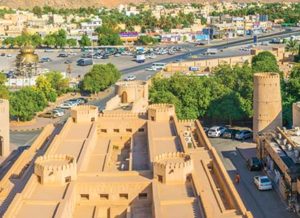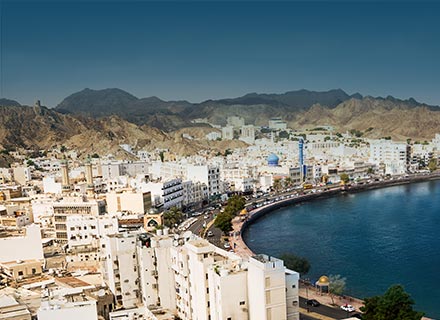Oman issued a Royal Decree in 2011 to introduce an Islamic financial system: a relatively new concept for the Sultanate then. This led to the establishment of two dedicated Islamic banks and six Islamic windows of conventional banks in the Arab country. The main purpose of the Royal Decree was to add six additional articles, 120 to 126, to the banking law of Oman to cultivate an Islamic banking culture. But despite the enactment of the law, a cautious approach from the government slowed the mainstreaming of Islamic finance. However, Islamic banking is growing at a faster pace than conventional banking in the Sultanate of Oman today. What are the reasons for the surprising growth of Islamic finance in a country that was late to adopt it?
According to the central bank of Oman, by December 2017, the credit uptake for Islamic banking was rising faster than that of conventional banking–at 25 percent year-on-year. Around the same period, a Moody’s report also stated that in the next five years, the assets of Islamic banks might reach the OMR three billion mark, signifying 10% of the country’s overall banking assets.
Pointing to a wider acceptance of Shariah-compliant products, Islamic banks accumulated assets worth RO4.3 billion as of December 2018, which represents 13% of Oman’s combined banking assets. With that, the industry in 2018 increased 76 percent in growth from 2017.
“This rapid growth is partly because we have had the advantage of learning from the experiences of Islamic banks in other jurisdictions,”Dr. Muhammad Iman Sastra Mihajat, head of Shariah, Oman Arab Bank, said. “The Central Bank of Oman does not allow the Islamic banking entities to use the contract of bay’ al-‘inah and tawarruq in their products because these contracts are still being debated among some of the global Shariah scholars.” Last March, the total market share of all Islamic banks in the Sultanate was valued at 12.4%, which represents OMR 3.99 billion in total assets, OMR 3.16 billion in total deposits, and OMR 3.18 billion in total financing, according to The Supreme Council for Planning.
“This remarkable achievement is likely to continue for the next five years,” Mihajat added. Even though Oman was the last country in the six-nation Gulf Cooperation Council (GCC) to introduce Islamic banking, the Islamic finance sector of the Sultanate is gaining a swift competitive advantage over the rest of the region for three reasons.
 First of all, a possible factor firming up the growth of Islamic banks over conventional banks is a robust regulatory framework. Expert and experienced Islamic banking and finance executives drawn from the global Islamic finance market designed the Islamic Banking Regulatory Framework of the Central Bank of Oman, according to Khalid Al Kayed, CEO of Bank Nizwa. The framework applies to the country’s two full-fledged Islamic banks: Bank Nizwa and Alizz Islamic Bank, and the six Islamic windows: Al Yusr Islamic Banking, Meethaq Islamic Banking, Muzn Islamic Banking, Sohar Islamic Bank, Maysarah Islamic Bank, and Al Hilal Islamic Bank, that acted as ‘auxiliaries’ to the independent Islamic banks in their early stage.
First of all, a possible factor firming up the growth of Islamic banks over conventional banks is a robust regulatory framework. Expert and experienced Islamic banking and finance executives drawn from the global Islamic finance market designed the Islamic Banking Regulatory Framework of the Central Bank of Oman, according to Khalid Al Kayed, CEO of Bank Nizwa. The framework applies to the country’s two full-fledged Islamic banks: Bank Nizwa and Alizz Islamic Bank, and the six Islamic windows: Al Yusr Islamic Banking, Meethaq Islamic Banking, Muzn Islamic Banking, Sohar Islamic Bank, Maysarah Islamic Bank, and Al Hilal Islamic Bank, that acted as ‘auxiliaries’ to the independent Islamic banks in their early stage.
Second, the well-documented frequency of financial crises that has come to grip conventional banks has profound implications for Islamic banking in Oman and everywhere else in the world. That said, the founding and evolution of Islamic banking has been driven by the recognition of the sanctity of Islamic banking. A robust governance system mandated by a Shariah Board enforces strict prohibitions on controversial products such as Tawarruq and all banks adhere to Accounting and Auditing Organisation for Islamic Financial Institutions (AAOIFI) standards. Islamic windows operate as separate branches in the country. Currently, there are 81 dedicated branches with Shariah-compliant financing across various parts of the country. In all cases, there is no manipulation or interest involved in transactions, and that, is highly appealing to Muslims and non-Muslims residing in Oman.
Third, Islamic banking not only supports high-profile clients, but small and medium enterprises. There are many entrepreneurs in Oman who have received help from the industry to expand their business.
The expansion of the industry will increase the country’s GDP because Islamic banking entities are involved in real economic activities. “If they can gradually take a bigger share of the conventional financing in the country, especially in relation to major projects and trade investments, and also if there are concrete steps towards improving Oman’s indigenous human capital, the industry will positively lead to good economic growth,” said Sheikh Bilal Khan, partner and head of Islamic Finance at McCarthy Denning and chief Islamic finance officer at Astana International Financial Centre.
To make that happen, Islamic banking will have to create new paths for progression. For example: Oman’s adoption model for Islamic banking is distinct compared to other GCC countries. And this distinctiveness is attributed to factors such as, the bank within a bank model, assigned capital, separate branches for Islamic banking, exclusive books of accounts, dedicated staff, and windows; and Islamic banks’ access to funds from conventional banks under the terms of Islamic compliance.
But loopholes also exist. Islamic banking entities lack sufficient knowledge in the industry’s financial transactions and activities because of a limited supply of expert human capital, insufficient liquid instruments in the Islamic money market, and restricted sukuk issuance in the secondary market. For this reason, the Industry’s stakeholders are collectively tasked with fighting those challenges in a short time span.
“The major Islamic banking entities need to incorporate Shariah governance in their good corporate governance framework,” Mihajat explained. Regulatory authorities are devoted to introducing new Islamic money market instruments and initiating establishment of Islamic Deposit Insurance Scheme, so that Islamic banking entities will be able to fully comply with Sharia principles while developing faster than commercial banks.

